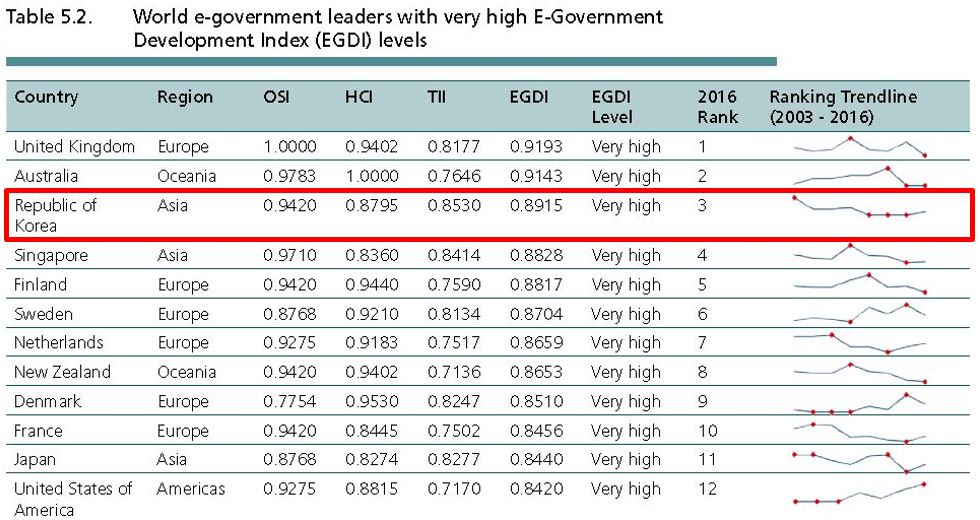[UN] UN E-Government Survey 2016
UN E-Government Survey 2016
See more information
The United Nations E-Government Survey 2016: E-Government in Support of Sustainable Development was launched in July 2016.
It offers a snapshot of trends in the development of e-government in countries across the globe:
- There has been a sharp rise in the number of countries that are using e-government to provide public services online through one stop-platforms – an approach that makes it easier to access public services. In 2003, only 45 countries had a one-stop-platform, and only 33 countries provided online transactions. According to the 2016 Survey, 90 countries now offer one or more single entry portal on public information or online services, or both and 148 countries provide at least one form of online transactional services. More countries are making an effort through e-government to ensure that public institutions are more inclusive, effective, accountable and transparent. Many governments across the globe are opening up their data for public information and scrutiny. The 2016 Survey shows that 128 countries now provide datasets on government spending in machine readable formats.
- Enabled by the easy access to social media, an increasing number of countries are moving towards participatory decision-making. While developed countries, especially European countries, are among the top 50 performers, many developing countries - especially lower-middle income countries - are making good progress. Enhanced e-participation can support the realization of the SDGs by enabling more participatory decision making. There have been increased efforts to utilize advanced electronic and mobile services for the benefit of all. Fixed and wireless broadband subscriptions have increased unevenly across regions, with Europe leading and coming closer to market maturation, while Africa is still lagging behind. The overall availability of broadband has increased, but substantial regional disparities and a growing divide persist. All countries agreed, in SDG 9, that a major effort is required to ensure universal access to internet in the least developed countries.

Table 5.2 shows a list of countries leading in e-government development, with corresponding EGDI values and its three components, namely the Online Service Index (OSI), the Telecommunication Infrastructure Index (TII) and the Human Capital Index (HCI).4 For the first time, the top ranking goes to the United Kingdom, which was ranked fifth in the 2003 Survey and now get the top ranking among the top 10 in the Survey 2016. This achievement was also won through, among others, efficiency gains which resulted in savings of £1.7bn in 2014 through its digital and technology transformation (Foreshew-Cain, 2015). Eighty-five per cent of self-assessment tax filing is now done through online channels and over 98 per cent of driving tests are now booked online (Foreshew-Cain, 2015).
Australia retains its second position while the Republic of Korea, ranked first in the 2014 Survey, falls to the third position. The Australian Government has been one of the early adopters of an extensive one-stop national portal, offering citizens a secured single sign-on for access to various interactive services, both at the federal and local levels, ranging from birth certifications to medicare, taxation, job search, aged care, child support, and among others(Government of Australia, 2015). The establishment of the Digital Transformation Office as an executive agency under the Australian Prime Minister’s portfolio in July 2015 signalled another milestone in advancing the government’s commitment to lead the transformation of services, using “technology to make services simpler, clearer and faster for Australian families and businesses” (Government of Australia, 2016).
Likewise, the Republic of Korea continues to innovate in e-government through its plan to move over 750 e-government services to the cloud by the end of 2016; by 2017, an estimate of more than 60 percent of e-government services will have been transferred to cloud computing (Iglauer, 2015 and Ahcopra, 2015). It is pertinent to note that a relative decline in rankings does not necessarily imply that countries have done less but rather those holding leadership positions have advanced or performed better than others.
.JPG)
.JPG)